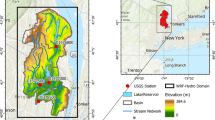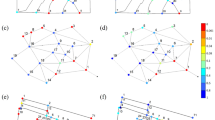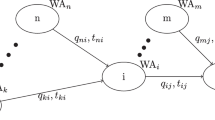Abstract
A nested optimization approach is proposed to solve capacity expansion problems of multiquality water supply systems. The problem to be solved consists of determining the infrastructure that should be built and/or rehabilitated at a specific time. This decision should be taken in a long-term planning perspective. It should consider how the operation will be performed to satisfy demand and water quality requirements by using multiple sources with different water quality at the source, take into account the temporal and spatial distribution of the water resources available and remain aware of the environmental impacts. In addition, decision processes which do not appropriately consider inherent uncertainties (e.g., hydrological, demographic, and technological uncertainties) can lead to suboptimal solutions. Here, uncertainty is handled using scenario planning with the aim of finding expansion solutions that can be expected to perform well under a set of possible future situations (or scenarios). The solution method combines simulated annealing with nonlinear programming to determine the solution to the nested optimization problem.



Similar content being viewed by others
References
Afshar A, Masoumi F, Solis SS (2015) Reliability based optimum reservoir design by hybrid ACO-LP algorithm. Water Resour Manag 29(6):2045–2058. doi:10.1007/s11269-015-0927-9
Buishand TA, Brandsma T (2001) Multisite simulation of daily precipitation and temperature in the Rhine basin by nearest-neighbor resampling. Water Resour Res 37(11):2761–2776
Cai XM, McKinney DC, Lasdon LS (2001) Solving nonlinear water management models using a combined genetic algorithm and linear programming approach. Adv Water Resour 24(6):667–676
Chen YW, Chang LC, Huang CW, Chu HJ (2013) Applying genetic algorithm and neural network to the conjunctive use of surface and subsurface water. Water Resour Manag 27(14):4731–4757. doi:10.1007/s11269-013-0418-9
Colson B, Marcotte P, Savard G (2007) An overview of bilevel optimization. Ann Oper Res 153:235–256
Cunha MC (1999) On solving aquifer management problems with simulated annealing. Water Resour Manag 13(3):153–169
Hajiabadi R, Zarghami M (2014) Multi-objective reservoir operation with sediment flushing; case study of Sefidrud reservoir. Water Resour Manag 28(15):5357–5376. doi:10.1007/s11269-014-0806-9
Hashimoto T, Stedinger JR, Loucks DP (1982) Reliability, resiliency, and vulnerability criteria for water-resource system performance evaluation. Water Resour Res 18(1):14–20
Herman JD, Zeff HB, Lamontagne JR, Reed PM, Characklis GW (2016) Synthetic drought scenario generation to support bottom-up water supply vulnerability assessments. J Water Resour Plan Manag. doi:10.1061/(ASCE)WR.1943-5452.0000701
Hidroprojecto and Ambio (2005) Expansion of the water supply to the Algarve – technical-economic study. Lisbon (in Portuguese)
Hsu NS, Cheng WC, Cheng WM, Wei CC, Yeh WWG (2008) Optimization and capacity expansion of a water distribution system. Adv Water Resour 31(5):776–786
Kang D, Lansey K (2013) Scenario-based robust optimization of regional water/wastewater infrastructure. J Water Resour Plan Manag 139(3):325–338. doi:10.1061/(ASCE)WR.1943-5452.0000236
Kasprzyk JR, Reed PM, Characklis GW, Kirsch BR (2012) Many-objective de novo water supply portifolio under deep uncertainty. Environ Model Softw 34:87–104. doi:10.1016/j.envsoft.2011.04.003
Kasprzyk JR, Nataraj S, Reed PM, Lempert RJ (2013) Many objective robust decision making for complex environmental systems undergoing change. Environ Model Softw 42:55–71. doi:10.1016/j.envsoft.2012.12.007
Kjeldsen TR, Rosbjerg D (2004) Choice of reliability, resilience and vulnerability estimators for risk assessments of water resources systems. Hydrol Sci J 49(5):755–767
Lan FJ, Lin WH, Lansey K (2015) Scenario-based robust optimization of a water supply system under risk of facility failure. Environ Model Softw 67:160–172
Li CL, Zhou JZ, Ouyang S, Wang C, Liu Y (2015) Water resources optimal allocation based on large-scale reservoirs in the upper reaches of Yangtze River. Water Resour Manag 29(7):2171–2187. doi:10.1007/s11269-015-0934-x
Loucks DP (1997) Quantifying trends in system sustainability. Hydrol Sci J 42(4):513–530
Matalas NC (2012) Comment on the announced death of stationarity. J Water Resour Plan Manag 138(4):311–312
Milly PCD, Betancourt J, Falkenmark M, Hirsch RM, Kundzewicz ZW, Lettenmaier DP, Stouffer RJ (2008) Climate change - stationarity is dead: whither water management? Science 319(5863):573–574. doi:10.1126/science.1151915
Mulvey JM, Vanderbei RJ, Zenios SA (1995) Robust optimization of large-scale systems. Oper Res 43(2):264–281
Ray PA, Watkins DW Jr, Vogel RM, Kirshen PH (2014) Performance-based evaluation of an improved robust optimization formulation. J Water Resour Plan Manag 140(6):04014006
Reis LFR, Walters GA, Savic D, Chaudhry FH (2005) Multi-reservoir operation planning using hybrid genetic algorithm and linear programming (GA-LP): an alternative stochastic approach. Water Resour Manag 19(6):831–848
Reis LFR, Bessler FT, Walters GA, Savic D (2006) Water supply reservoir operation by combined genetic algorithm-linear programming (GA-LP) approach. Water Resour Manag 20(2):227–255. doi:10.1007/s11269-006-8049-z
Ricciardi KL, Pinder GF, Karatzas GP (2007) Efficient groundwater remediation system design subject to uncertainty using robust optimization. J Water Resour Plan Manag 133(3):253–263
Ricciardi KL, Pinder GF, Karatzas GP (2009) Efficient groundwater remediation system designs with flow and concentration constraints subject to uncertainty. J Water Resour Plan Manag 135(2):128–137
Rosenberg DE, Lund JR (2009) Modeling integrated decisions for a municipal water system with recourse and uncertainties: Amman, Jordan. Water Resour Manag 23(1):85–115
Salas JD, Rajagopalan B, Saito L, Brown C (2012) Special section on climate change and water resources: climate nonstationarity and water resources management. J Water Resour Plan Manag 138(5):385–388
Sandoval-Solis S, McKinney DC, Loucks DP (2011) Sustainability index for water resources planning and management. J Water Resour Plan Manag 137(5):381–390
Schmitz F, Wöhling T, de Paly M, Schütze N (2007) GAIN–P: a new strategy to increase furrow irrigation efficiency. Arab J Sci Eng 32(1C):103–114
Sinha A, Malo P, Deb K (2013a) Efficient evolutionary algorithm for single-objective bilevel optimization. arXiv:1303.3901v2 [cs.NE]
Sinha A, Malo P, Frantsev A, Deb K (2013b) Multi-objective Stackelberg game between a regulating authority and a mining company: a case study in environmental economics. In: 2013 I.E. congress on evolutionary computation (CEC-2013), Cancun, pp 478–485
Stackelberg H (1952) The theory of market economy. Oxford University Press, Oxford
Tseng HW, Gan TY, Yu PS (2015) Composite drought indices of monotonic behaviour for assessing potential impact of climate change to a water resources system. Water Resour Manag 29(7):2341–2359. doi:10.1007/s11269-015-0945-7
Vicente LN, Calamai PH (1994) Bilevel and multilevel programming: a bibliography review. J Glob Optim 5(3):291–306
Vieira J (2014) Decision models for the management of multisource water supply systems. PhD Thesis, University of Coimbra (in Portuguese)
Vieira J, Cunha MC (2011) A two steps solution approach to solving large nonlinear models: application to a problem of conjunctive use. Water Sci Technol 64(12):2492–2499
Vieira J, Cunha MC, Nunes LM, Monteiro JP, Ribeiro L, Stigter TY, Nascimento J, Lucas H (2011) Optimization of the operation of large-scale multisource water-supply systems. J Water Resour Plan Manag 137(2):150–161
Vogel RM, Shallcross AL (1996) The moving blocks bootstrap versus parametric time series models. Water Resour Res 32(6):1875–1882
Watkins DW, McKinney DC (1999) Screening water supply options for the Edwards aquifer region in Central Texas. J Water Resour Plan Manag 125(1):14–24
Yang SL, Sun YH, Yeh WWG (2000) Optimization of regional water distribution system with blending requirements. J Water Resour Plan Manag 126(4):229–235
Zongxue X, Jinno K, Kawamura A, Takesaki S, Ito K (1998) Performance risk analysis for Fukuoka water supply system. Water Resour Manag 12(1):13–30
Acknowledgements
This study had the support of Fundação para a Ciência e Tecnologia (FCT), through the strategic project UID/MAR/04292/2013 granted to MARE.
Author information
Authors and Affiliations
Corresponding author
Rights and permissions
About this article
Cite this article
Vieira, J., Cunha, M.C. Nested Optimization Approach for the Capacity Expansion of Multiquality Water Supply Systems under Uncertainty. Water Resour Manage 31, 1381–1395 (2017). https://doi.org/10.1007/s11269-017-1584-y
Received:
Accepted:
Published:
Issue Date:
DOI: https://doi.org/10.1007/s11269-017-1584-y




